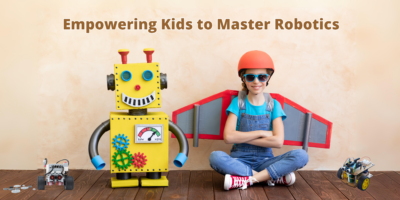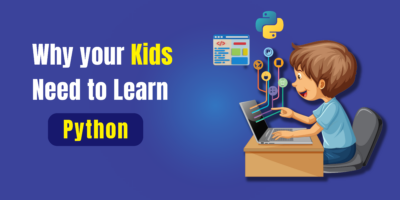It’s important to give kids the skills they’ll need for well-paying jobs in the future in today’s changing labor market.
Even if traditional education is still vital, there is a rising need to broaden the curriculum and include disciplines that reflect current global trends and technology breakthroughs.
This blog delves into five critical fields of study that extend beyond programming. By providing a well-rounded education, we can equip our kids with the skills they need to succeed in the fast-paced, cutthroat world of the future and put them in an advantageous position for future employment.
- Artificial Intelligence (AI) and Machine Learning (ML)
The global industry is undergoing a revolution- thanks to AI and ML- making them important topics for the coming generation to study.
Artificial intelligence (AI) is the computer equivalent of human intelligence. It enables computers to perform tasks like speech recognition, decision-making, visual perception, and language translation that typically need human intelligence.
Developing algorithms for machine learning, a branch of artificial intelligence, allows computers to learn from experience and become more intelligent without explicit programming.
Why AI and ML are important for children?
A) Future Employment Prospects: With the growth of AI and machine learning, there will be an increased need for seasoned professionals with the know-how to create, manage, and enhance these systems.
B) Problem-Solving Ability: By teaching kids how to tackle difficult problems creatively, AI and ML education helps kids strengthen their analytical and problem-solving abilities.
C) Interdisciplinary Learning: These subjects offer abundant opportunities for interdisciplinary learning because they overlap with many other disciplines, such as computer science, mathematics, and even ethics.
- Data Analysis and Data Interpretation
Data is becoming a crucial component of decision-making in firms all around the world in the digital age.
For organizations looking to maintain their competitive edge and make well-informed strategic decisions, the capacity to gather, evaluate, and comprehend data is essential.
Data’s Importance in the Digital Age:
A) Knowledgeable Decision-Making: Data gives companies evidence-based insights that help them make decisions with a higher chance of success.
B) Predictive analytics: Businesses can predict future trends and make appropriate preparations by analyzing data from the past and present.
C) Personalization: By using data analysis, companies may comprehend consumer preferences and tailor goods and services to suit specific requirements.
Competencies in Data Interpretation and Analysis:
A) Data Collection: Compiling reliable and pertinent data is the initial stage in the process of data analysis. Surveys, tests, or database mining may be used for this.
B) Data Cleaning and Organization: Error-free data must be cleaned and organized to make it easier to deal with before analysis can begin.
C) Statistical Analysis: One of the most important aspects of data analysis is the ability to identify patterns, correlations, and trends in data by using statistical techniques.
D) Data Visualization: Using graphical representations of data, like graphs or charts, can assist convey findings understandably and efficiently.
3. The Knowledge of Finance and Entrepreneurship
To achieve financial independence and navigate the intricacies of the contemporary market, one must possess both entrepreneurship and financial literacy.
Early instruction in these areas prepares kids for a secure and successful future.
Knowing the Fundamentals of Investment, Budgeting, and Finance:
A) Knowledge of finance: Surveys, tests, or database mining may be used for this.
B) Data Cleaning and Organization: Error-free data must be cleaned and organized to make it easier to deal with before analysis can begin.
C) Statistical analysis: identifying trends, correlations, and patterns in data by using statistical methods
To successfully navigate the intricacies of the contemporary market and attain financial independence, one must possess both entrepreneurial and financial literacy.
Early instruction in these areas prepares kids for a secure and successful future.
Knowing the Fundamentals of Investment, Budgeting, and Finance:
A) Financial literacy is the ability to manage money well, which includes earning, saving, and spending cash. It all comes down to making wise financial decisions that result in prosperity in terms of money.
B) Budgeting: Financial planning requires the ability to establish and stick to a budget. It assists people in making wise resource allocation decisions so they can save for future objectives and meet their necessities.
C) Investing: Building money over time requires an understanding of the fundamentals of investing, including the idea of compound interest and the significance of diversifying investments.
Fostering an Attitude of Entrepreneurship and the Capacity to Grab Chances:
A) Entrepreneurial Mindset: Teaching kids to think like entrepreneurs promotes their inventiveness, problem-solving skills, and proactive approach to seeing business prospects.
B) Opportunity Recognition: Successful entrepreneurship depends on teaching kids to identify market possibilities and evaluate their viability. This entails analyzing trends, figuring out what customers need, and finding market gaps.
C) Risk management: Taking measured risks is a part of being an entrepreneur. Youngsters should be taught to balance the risks and potential rewards, as well as to create plans to reduce the dangers.
4. Sustainability and Environmental Science
“There is no Planet B.” Children should study environmental science and sustainability because they address the pressing need to comprehend and mitigate the negative consequences of human activity on the environment and climate.
These academic fields cultivate an awareness of one’s duty to the environment and promote actions that guarantee a sustainable future.
The significance of comprehending how human activity affects the environment:
A) Knowledge of Global Challenges: Teaching kids about environmental science enables them to appreciate the scope of issues like pollution, climate change, and biodiversity loss.
B) Personal Responsibility: Children who are aware of how their actions affect the environment are better equipped to make more environmentally friendly decisions in their daily lives.
C) Informed Decision-Making: Children who are aware of environmental issues are better equipped to engage in debates and make judgments about behaviors and policies that have an impact on the environment.
Promoting Sustainable Attitudes and Behaviors:
A) Developing Sustainable Habits: Children who get sustainability education are more likely to adopt behaviors that save energy, cut down on waste, and save the environment.
B) Investigating Green Technologies: Introducing kids to eco-friendly materials, sustainable agriculture, and renewable energy sources encourages them to come up with original solutions to environmental issues.
C) Encouraging Outdoor Activities and Natural Environment Exploration: Children who are encouraged to explore outdoors are more likely to have a profound respect for the Earth.
5. Soft Skills: Teamwork, Creativity, and Communication
Soft skills, such as teamwork, creativity, and communication, are essential for success in both personal and professional contexts in today’s interconnected and dynamic world.
These skills allow people to work well with others, come up with original solutions to problems, and adjust to changing circumstances.
The Value of Mastering Effective Communication Techniques:
A) Effective Teamwork: Successful teamwork is built on a foundation of clear and effective communication. It guarantees that concepts, directives, and criticism are comprehended and implemented.
B) Leadership: The ability to inspire, motivate, and mentor others is a prerequisite for effective communication.
C) Developing Relationships: Good communication skills are essential for creating and maintaining positive relationships with stakeholders, clients, and coworkers.
Highlighting Innovation and Creativity:
A) Solving Problems: The key to finding solutions to problems is creativity. It makes it possible for people to think creatively and unconventionally to solve challenging issues.
B) Adaptability: Success in the ever-evolving world of today depends on one’s ability to innovate and adjust to novel circumstances.
C) Advancing Technology, Processes, and Products: Innovation and creativity are the main forces behind developments in any industry.
Promoting Teamwork:
A) Team Synergy: Effective collaboration involves utilizing the diverse abilities and perspectives of team members to achieve a shared objective, leading to improved outcomes.
B) Conflict Resolution: By addressing differences in a way that benefits the team, collaborative skills assist constructively settle problems.
C) Networking: Creating a network of associates can lead to new educational possibilities to learn, grow, and advance in your career. Such an opportunity is Clevered’s AI Internships with retd. Oxford University Senior Researcher and NASA’s former Chief Scientist.
To conclude:
It’s critical to embrace a more wide range of abilities and look beyond traditional topics while educating our kids for the future.
These abilities not only help people land well-paying professions, but they also help people develop into well-rounded people who can solve challenging situations, make wise judgments, and benefit society as a whole.
It is our duty as educators and parents to provide kids the skills they will need to thrive in the future, and by putting a strong emphasis on these five important areas, we can help them get started on the path to a successful and fulfilling career.








